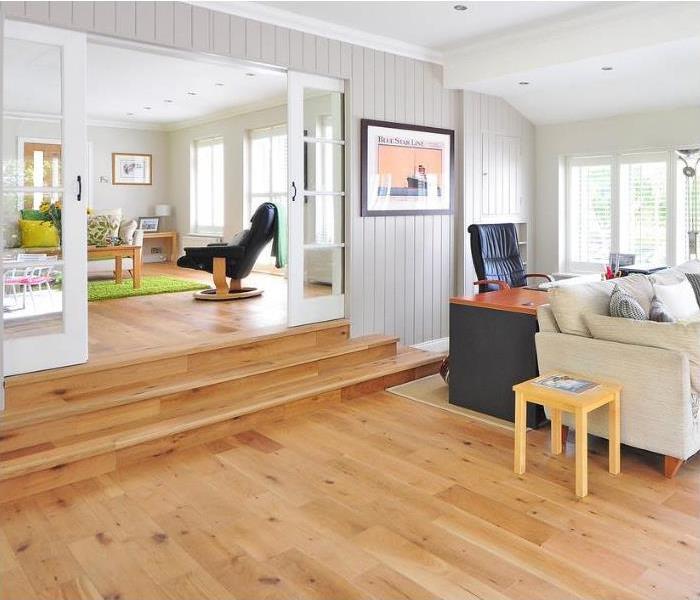3 Tips for Quickly Repairing Water Damaged Hardwood Floors
7/21/2021 (Permalink)
A property with hardwood flooring is never safe from water damage.
Water damage can be a devastating event for any homeowner. Not only does water damage create an unpleasant environment, but it also means that water has damaged your hardwood floors. The good news is there are some simple steps you can take to repair water-damaged hardwood floors and get them looking like new again! In this blog post, we will go over the top 3 tips for quickly repairing water-damaged hardwood floors.
Causes of hardwood floor water damage
It is unfortunate that water damage can happen to anyone and will be very disappointing when it damages beautiful hardwood floors. When excess water gets on your hardwood floors, it will create water stains and possibly warp the wood. Hardwood water restoration is a challenging project that requires special care to save the hardwood flooring from having to be removed.
The most common causes of hardwood flooring water damage will result from pipe bursts or appliance leaks. These water-related problems can be difficult to detect and may not happen right away. It is best to check your water heater, kitchen sink, dishwasher, or any other water source often for leaks!
Hardwood floor drying
In most cases, hardwood will soak up any water and appear dry. To save the hardwood flooring, the best course of action will be to properly place a dehumidifier and fans to remove all excess water. Properly placed fans paired with a dehumidifier will work in conjunction with one another to help move air particles into the air and remove all excess moisture.
The only way to be certain that the hardwood floors are completely dry will be by using a moisture meter. A moisture meter will measure water content in the material. The hardwood will be dry when the moisture reading is below 8%.
The 3 Tips for quick hardwood floor water repairs
1) Contact your homeowner's insurance company at the first sign of hardwood floor water damage. Quickly contacting your insurance provider will start the claims process so you can get your property back to normal as soon as possible. Your insurance adjuster will likely recommend that you take preloss pictures and videos for documentation purposes during the initial call. An insurance adjuster may also recommend making a spreadsheet that includes a detailed list of all damaged items.
2) Remove salvageable items that are on top of the hardwood wood floors as soon as possible. Anytime water damage strikes, you will want to try to salvage as many items as you can. The best thing you can do is remove all salvageable items to an area of the property that wasn't damaged.
3) Contact a professional water damage restoration company to handle repairs
No matter what the cause of the hardwood floor water damage, it should be handled by water restoration professionals. The IICRC has trained water restoration professionals to adequately dry a property through extensive drying techniques. Water damage restoration should never be attempted as a DIY project; it will likely result in secondary damages.
Hardwood floors with mold damage
Mold will likely develop on and under hardwood surfaces that were wet for too long. When hardwood shows indications of mold, then the best course of action will be to remove the hardwood flooring completely and install new flooring.
Wrapping up
We hope you enjoyed learning about water-damaged hardwood floors. For any water damage in your home, you should consider contacting the water restoration professional at SERVPRO of South Cobb to help.
Our IICRC certified professionals have gone through extensive training to remove all standing water and dry out any remaining moisture with advanced drying techniques.
Contact us today!

 24/7 Emergency Service
24/7 Emergency Service
